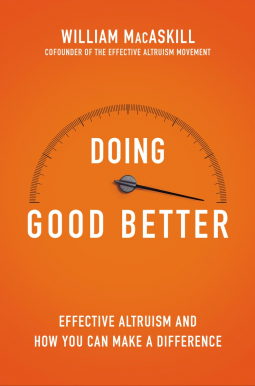
Doing Good Better
How Effective Altruism Can Help You Make a Difference
by William MacAskill
This title was previously available on NetGalley and is now archived.
Buy on Amazon
Buy on BN.com
Buy on Bookshop.org
*This page contains affiliate links, so we may earn a small commission when you make a purchase through links on our site at no additional cost to you.
Send NetGalley books directly to your Kindle or Kindle app
1
To read on a Kindle or Kindle app, please add kindle@netgalley.com as an approved email address to receive files in your Amazon account. Click here for step-by-step instructions.
2
Also find your Kindle email address within your Amazon account, and enter it here.
Pub Date Jul 28 2015 | Archive Date Mar 08 2022
PENGUIN GROUP Gotham | Avery
Description
Most of us want to make a difference. We donate our time and money to charities and causes we deem worthy, choose careers we consider meaningful, and patronize businesses and buy products we believe make the world a better place. Unfortunately, we often base these decisions on assumptions and emotions rather than facts. As a result, even our best intentions often lead to ineffective—and sometimes downright harmful—outcomes. How can we do better?
While a researcher at Oxford, trying to figure out which career would allow him to have the greatest impact, William MacAskill confronted this problem head on. He discovered that much of the potential for change was being squandered by lack of information, bad data, and our own prejudice. As an antidote, he and his colleagues developed effective altruism, a practical, data-driven approach that allows each of us to make a tremendous difference regardless of our resources. Effective altruists believe that it’s not enough to simply do good; we must do good better.
At the core of this philosophy are five key questions that help guide our altruistic decisions: How many people benefit, and by how much? Is this the most effective thing I can do? Is this area neglected? What would have happened otherwise? What are the chances of success, and how good would success be? By applying these questions to real-life scenarios, MacAskill shows how many of our assumptions about doing good are misguided. For instance, he argues one can potentially save more lives by becoming a plastic surgeon rather than a heart surgeon; measuring overhead costs is an inaccurate gauge of a charity’s effectiveness; and, it generally doesn’t make sense for individuals to donate to disaster relief.
MacAskill urges us to think differently, set aside biases, and use evidence and careful reasoning rather than act on impulse. When we do this—when we apply the head and the heart to each of our altruistic endeavors—we find that each of us has the power to do an astonishing amount of good.
While a researcher at Oxford, trying to figure out which career would allow him to have the greatest impact, William MacAskill confronted this problem head on. He discovered that much of the potential for change was being squandered by lack of information, bad data, and our own prejudice. As an antidote, he and his colleagues developed effective altruism, a practical, data-driven approach that allows each of us to make a tremendous difference regardless of our resources. Effective altruists believe that it’s not enough to simply do good; we must do good better.
At the core of this philosophy are five key questions that help guide our altruistic decisions: How many people benefit, and by how much? Is this the most effective thing I can do? Is this area neglected? What would have happened otherwise? What are the chances of success, and how good would success be? By applying these questions to real-life scenarios, MacAskill shows how many of our assumptions about doing good are misguided. For instance, he argues one can potentially save more lives by becoming a plastic surgeon rather than a heart surgeon; measuring overhead costs is an inaccurate gauge of a charity’s effectiveness; and, it generally doesn’t make sense for individuals to donate to disaster relief.
MacAskill urges us to think differently, set aside biases, and use evidence and careful reasoning rather than act on impulse. When we do this—when we apply the head and the heart to each of our altruistic endeavors—we find that each of us has the power to do an astonishing amount of good.
Available Editions
| EDITION | Other Format |
| ISBN | 9781592409105 |
| PRICE | $26.95 (USD) |



